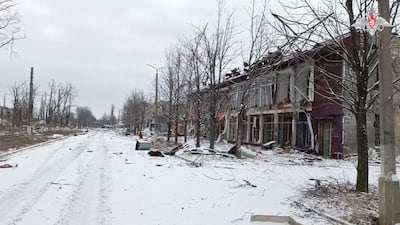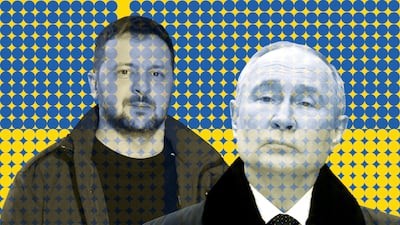This time last year, on the first anniversary of what Russia called its “special military operation” in Ukraine, it looked likely that there would, alas, be a second anniversary, as neither Russia nor Ukraine – nor the latter’s western backers – showed any interest in bringing the war to an end. And a second anniversary meant that what happened next would be complicated by presidential elections in the US, Russia and Ukraine.
Well, the second anniversary is upon us, and what is now more often known as Russia’s all-out war in Ukraine – to distinguish it from the limited hostilities in eastern Ukraine after 2014 – goes on. As forecast, the Russian and US elections will indeed be complications, although Ukraine’s election has been cancelled because of martial law.
But the elections are far from the only, or main, complications. Much has changed in the past year, starting with the situation in Ukraine. The steely unity of the Ukrainian leadership, and the solidarity between leaders and people, and between people and military, that held through the first year of the conflict has developed cracks.
In August, Ukrainian President Volodymyr Zelenskyy suddenly announced that he was dismissing all heads of regional military recruitment offices in connection with corruption and draft dodging. The next month, he replaced the generally well-regarded defence minister. Then, two weeks ago, he signed a decree dismissing his military chief, Valery Zaluzhnyi, ending weeks of rumours that Gen Zaluzhnyi had been asked, and refused, to resign.
It is too early to gauge the fall-out from this decision. Gen Zaluzhnyi was popular with the troops, and a Ukrainian of the post-independence generation. His replacement, the former army chief, Oleksandr Syrskyi, is by training and age more in the Soviet mould. But it could be argued that this is what is needed now.
Still, it hardly seems a good sign for Mr Zelenskyy to remove such senior people in the heat of a conflict, and there are reasons, other than fatigue and the need for new energy, that explain why they might have been replaced.
One was the course of the fighting. Ukraine’s early success – a success that surprised western allies, encouraged promises of more weapons and raised hopes of actual victory – was fading. A long-touted Ukrainian counter-offensive in early summer failed – a failure that may have cost Gen Zaluzhnyi his job. Ukraine has now been forced to retreat from the town of Avdiivka after a long and gruelling battle, which cost many lives. Under its new commander, the country is now pursuing a new plan focusing on defence.
But there may also be political reasons. Mr Zelenskyy’s constitutionally correct decision to cancel the presidential election has fuelled increasingly open criticism of his leadership. True, this comes primarily from a few who may harbour ambitions of their own, including the mayor of Kyiv, Vitaly Klitschko, and former president Petro Poroshenko. The dismissal of Gen Zaluzhnyi may also be seen in the same light. He and Mr Zelenskyy were also locked in a dispute about a new round of mobilisation, with the former insisting that the military needed more men, and the latter – probably rightly – seeing a new round of conscription as politically risky.

Periodic accusations of corruption are another factor, although it is not clear how far such claims are objectively justified and how far they are being used as weapons in a political struggle underway in Kyiv.
Views differ, too, about how far civilian and grassroots morale is being sapped by signs of discord at the top and the battlefield setbacks. On the one hand, Ukraine’s will to fight on appears strong, although there is evidence of weariness among fighters. On the other, the scale of Ukraine’s casualties, and the absence of new recruits to relieve those who have been fighting without a break, has spawned a small protest movement among wives and families of those in the field. Manpower appears to be becoming a problem.
This is not something often mentioned by Ukrainian officials or by its allies, who prefer to complain about the shortage of weapons and especially ammunition, which can be blamed on the West. How far to trust western statements that they are running out of resources to ensure their own security, let alone that of Ukraine, is also a question. Might smaller and slower deliveries rather reflect growing war fatigue among allies and their fears of sending good weapons after bad, now that Ukraine’s winning streak seems to have ended? Probably, it is a bit of both, with reduced faith in a Ukrainian victory and western countries’ own dwindling reserves militating against upping supplies.
This seems especially true of the US, where military and financial aid to Ukraine has become the subject of a fierce political stand-off in the legislature at the start of this election year. The quarrels may also be exacerbated by the prospect of Donald Trump winning back the White House. Mr Trump’s sceptical view of aid for Ukraine and the sense of the war is well-known. A U-turn on support for Ukraine, however, might not have to wait for a Trump victory; as things stand, Congress could halt any more aid packages on the current President’s watch.
The potentially dire consequences for Ukraine, should US aid dry up, have prompted much hard thinking in Europe – in the EU and among European members of Nato – about how and even whether it could fill any gap in support to Ukraine left by the US. The mood at the recent Munich Security Conference in Germany was downbeat, with some warning that a Russian victory in Ukraine could presage a Russian advance into the Baltic, Poland and beyond. How far such scaremongering is justified, or whether it is just another means of arguing for continued US support, however, is another matter. Given the difficulties Russia has experienced gaining even a few kilometres of Ukrainian territory in the past year, it seems unrealistic to think Russia could reach western Ukraine, let alone take on Poland.
What can be said, however, is that the fortunes of Russia over the past year have improved even as Ukraine’s have been sliding. Western sanctions have not had the longer-term effect, except perhaps in the automotive sector, that had been hoped for. Russia has found new markets for its energy, new arms suppliers and revived some military production. Russians have by and large rallied to the flag.
A little-explained mutiny by the Wagner private military group in June was quickly seen off by President Vladimir Putin, whose power may even have been strengthened as a result. Whatever the truth of the death of the opposition leader, Alexei Navalny, he was never going to be an electoral threat to Putin. With Avdiivka now giving Mr Putin a military victory to capitalise on, he looks set to sail through next month’s presidential elections to another six-year term. The war with Ukraine may not be exactly an election asset, but – barring a new spectacular advance from Ukraine – it will probably not be a liability either.
Perhaps the biggest potential game changer in the Russia-Ukraine conflict so far, however, came out of the clear blue sky, thousands of kilometres away from either Kyiv or Moscow. This came on October 7, when Hamas fighters burst out of Gaza, killing and injuring thousands of Israelis and taking more than 250 people captive.
Within hours of the news breaking, the international political and media spotlight had swung away from Ukraine and on to the Middle East, where it has stayed pretty much since, damaging Ukraine’s cause in many different ways.
It has left Ukraine suddenly competing for already depleted military supplies from the US. It has diverted US diplomatic and political attention back to its older client, Israel, and it deprived Ukraine of the western media attention that it had used so effectively to its advantage.
It has also had an unpredicted moral impact. Ukraine had long found it hard to build a strong international coalition in its support. Many countries outside the western orbit, including those in the so-called “global South”, had declined to take sides, treating Ukraine’s conflict with Russia as a bilateral quarrel. Western efforts to blame Russia’s Black Sea blockade for a global food crisis did not have the desired effect.
But Gaza made everything considerably worse for Ukraine. Supporters of the Palestinian cause the world over complained of a glaring double standard. How could the West invest so much in the defence of Ukraine’s statehood while ignoring Palestinian demands for their own state. To which the western world struggled to find an answer, and it is hard to see this changing.
Israel is of greater interest to the US – though probably not to the Europeans – than Ukraine, and for all the US insistence that Ukraine is a war the West cannot afford to lose, it is hard to see how Kyiv can command the attention of the US in the same way again, at least not until the presidential election is decided.
Washington could even decide that it prefers peace to war in Ukraine and try to push Kyiv towards talks – which it, and many of Ukraine’s most fervent European champions, would resist.
Most, but not all, of the changes over the past year have been in Russia’s favour. Ukraine has had its successes: it has loosened Russia’s hold on Crimea with attacks on its ships and its naval base at Sevastopol, and deterred Russian holidaymakers. It has unsettled Russia with drones that have reached Moscow, acts of sabotage behind Russian lines and strikes on cities, such as Belgorod, near the border. There is, though, a question about how much further such attacks could go, even if Ukraine had the capability, without eliciting a devastating Russian response.
Some call the current situation a stalemate; others – the continuation of a slow, but steady, Russian advance. As things stand, though, it is hard to envisage the fighting, if not the conflict, lasting another year. Russia has vastly more reserves, in men and materiel. Ukraine risks running out of both. Public sentiment in much of Europe, as in the US, seems to be gravitating towards talks. This will be a hard sell in Ukraine. It might mean the downfall of Mr Zelenskyy. But the combination of Russian resilience, US distraction, and Europe’s lack of resources, will have added to divisions in Kyiv and a simple shortage of Ukrainians to fight, as well as to bring the hot war, at least, to an end. The negotiators need to be ready.


